Introduction
Wales has stories to tell.
Tourism is a platform for telling those stories, whether it be about our heritage, language and culture, or the tales of new industries and our focus on sustainability and quality local food in Wales – all have a knock-on effect for trade and investment, in telling people who we are, what we value, and what we do well. Tourism provides a window for Wales to the world, an opportunity to share our values and say who we are, and what we have to offer.
For small to medium sized enterprises in Wales, tourism provides market access where potentially, ‘all the world’s a stage.’ While SMEs are the overwhelming majority of players in the industry, all the players in Wales are important. The brand of Wales needs to be accessible by the widest pool of stakeholders possible.
It is only by having the tools to share their story, that SMEs in Wales can reflect their values and their offer, rather than have it dictated from above. Wales has a depth of history and culture, so empowering SMEs to market this themselves is vital.
Given the opportunity and the means to do so, smaller businesses are perfectly placed to tell – and to sell – our story to visitors in Wales, UK, and the world. Building capability from the bottom up, and on the things that matter to them and their audiences, allows businesses to provide for a stage outside the busy seasons, and look to build skills and markets for a more sustainable footing.
All parts of the puzzle mutually reinforce each other and require taking a concerted and holistic strategic approach based on the pillars of engagement and participation of SMEs in the tourism strategy and implementation. Equally important is building the brand and our stories from the bottom up, developing the sectors capacity and skills and aligning tourist value with wider policy development through the future generations agenda, and the levelling up agenda, shaped for long term development.
The impacts of Covid-19, Brexit and the cost of living remain uncertain over the long term, in terms of the impact of international arrivals, and where they come from. Will ‘staycations’ be a temporary reaction to market conditions, or will this reshape the market and can Wales benefit? All these questions and uncertainties make for a sector that is buffeted by the current storms. It is important that governments and their agencies look to provide direction, based on clear principles that understand the value of the sector, as well as how to use the current situation to develop and transition the sector for the future.
So, what are the stories of Wales and who should tell those stories in the tourism context? How do we bring together our storytellers, to amplify the message of Wales with authenticity and depth in a way that chimes with our real experiences and values? How do we tell the world who we are and what we stand for?
The title of ‘Welcoming Communities’ conveys many sides to the report, by reiterating the continued welcome from our communities to visitors, but it is also about welcoming the wider community in Wales, and our local business communities into the process of shaping our tourism stories, marketing, and strategies. We all have our stories to tell and our part to play in shaping how we tell others who we are and what we value in Wales.
This report reflects this ideal, and looks at how we can look to use SMEs to the full to develop sustainable tourism for Wales for the future.
Key Statistics
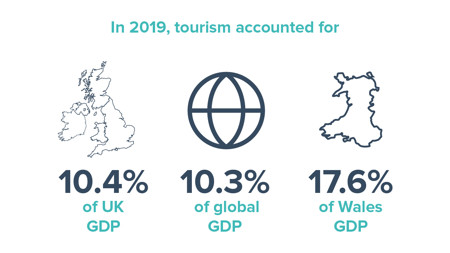
[Image Text] In 2019, tourism accounted for 10.4% of UK GDP, 10.3% of Global GDP and 17.6% of Wales GDP
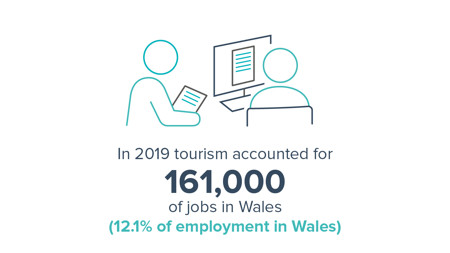
[Image Text] In 2019 tourism accounted for 161,000 of jobs in Wales (12.1% of employment in Wales)
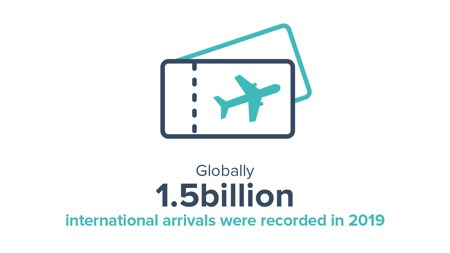
[Image Text] Globally, 1.5 billion international arrivals were recorded in 2019
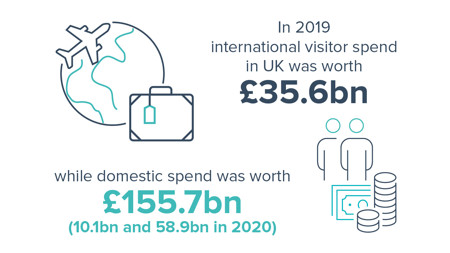
[Image text] In 2019 international visitor spend in the UK was worth £35.6bn while domestic spend was worth £155.7bn (10.1bn and 58.9bn in 2020)
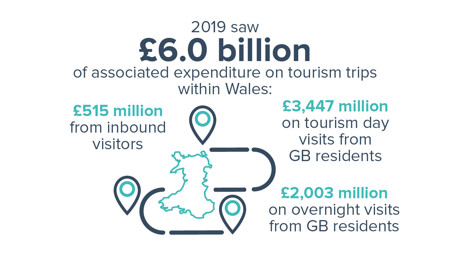
[Image text] 2019 saw £6.0 billion of associated expenditure on tourism trips within Wales. £515 million from inbound visitors, £3,447 million on tourism day visits from GB residents and £2,003 million on overnight visits from Gb residents.
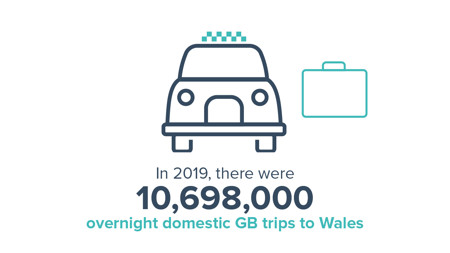
[Image text] In 2019, there were 10,698,000 overnight domestic GB trips to Wales
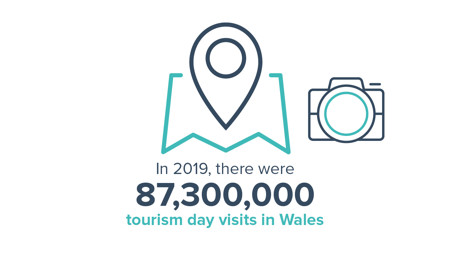
[Image text] In 2019, there were 87,300,000 tourism day visits in Wales
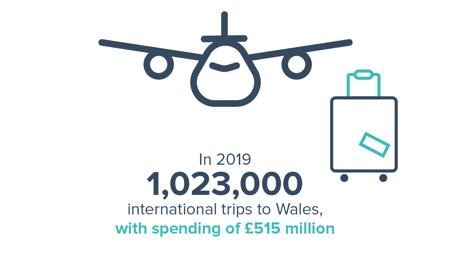
[Image text] In 2019 1,023,000 international trips to Wales, with spending of £515 million
Recommendations
General
- A Post-Brexit and Post-peak Covid ‘Welcome to Wales’ marketing campaign should be undertaken both to UK, international audiences, and to the market in Wales
Visitor pledge
Wales should further develop and embed the ‘Addo’ visitor’s pledge and how to best market and implement it
- This would promote ethical behaviour, share information on safety, bookings, and recommendations to disperse activity (ideally in real time), and promote Wales in both languages.
- This should include partnership with the sector, resident groups, and promotion of the pledge across businesses throughout Wales with invitations to sign. • Thematically it could be addressed to future generations, modelled on the ‘Leave No Trace’ sustainable travel principles.
- It can also play a prominent part in Visit Wales and Visit Britain websites (such as on the ‘Know Before You Go’ page), with the latter a means for looking at promoting Wales as a differentiated brand within Britain and aligned to developing a sustainable tourism brand based on wider Welsh ‘future generations’ policy.
- Welsh Government should explore use of a Visit Wales App, exploring its use as a digital gateway and in providing seamless links to visitor behaviour nudges and safety tips, real time data on visitor peak times and alternative areas to visit, and management and push to promote different access roads to areas, as well as links to transport information.
- This should look to how we can use information gathered through a wider approach on marketing and using (for example) SMEs and individual towns own use of the system to maximise the local curation of the visitor experience.
Regulations
Consistent and fair regulation is important to small business to provide a level playing field, particularly in relation to the ‘informal economy.’ However, it must be done on a clear, rational, and proportionate basis, so as to retain the trust of the sector and local community alike, and to be monitored for unintended consequences.
- Regulatory strategy should fit within a wider pro-business ‘think small first’ strategic approach through an Economic Development Bill, as advocated in other reports by FSB Wales.
- Any new threshold must be logically linked to seasonal activity (e.g., number of days expected to be active), or linked to how many days we would expect in an average tourism season and measured on a clear and rational basis.
- The current post-Covid tourism visitor market is very uncertain and unstable, and so such a market analysis should take this into account in a rationale for new thresholds. A possible way to deal with this is to raise the threshold incrementally alongside a review process to identify the market impacts.
- The new proposed licensing regime would appear to be aimed at identifying businesses, and so dealing with the fear of tax evasion and illegitimate use of the business tax system for the avoidance of council tax. Any licensing regime should be considered in rationale for the new thresholds, as an alternative means to identify legitimate businesses in this area.
- A licensing regime could also be used to provide materials for engagement to the visitors through the businesses themselves, on a co-created basis (see next chapter).
- Thresholds could be aligned to provide consistency, such as the 210 days availability and 105 overnight stays as set by HMRC.
Wales Brand
A digital hub for user generated content should be extended for SMEs to create their own materials for their own marketing under the Wales brand.
- Branding and content management should be on a decentralised model to ensure content and marketing can be sourced from a more dispersed pool of images and stories.
- This content would then be monitored and measured for new areas of successful marketing through decentralised approach looking to use SMEs own experience and expertise in their own markets to help Visit Wales’s general approach.
- Access by SMEs to the digital hub to build its own marketing would be dependent on signing up to the pledge and code of conduct, on disseminating any visitor pledge and Users should agree on data monitoring by Visit Wales and Welsh Government to track successful campaigns.
- Free translation should be explored as an option throughout this process. • Visit Wales and Visit Britain should work together with FAW to promote Wales as the smallest country to qualify for the 2022 World Cup and develop the opportunities which come from the World Cup along with partners in business.
- The Welsh language should be better used as a ‘hook,’ and particularly targeted where this may raise awareness and interest internationally, such as in future trade agreements.
- The Welsh Language should be viewed as a comparative advantage to branding and telling stories of Wales. • It should be harnessed for promotion materials, and should be used as badge of differentiation
- and authenticity internationally both within a Welsh and British brand.
- Transport infrastructure needs to be aligned with tourist policy, particularly in rural areas, with a view to developing the sustainable / eco-tourism brand.
Value and tourism tax
At a time of rising costs and stalled economic recovery, discussions on more tax are unhelpful, so tourism tax should be kept off the table at least until the economy recovers.
- UK, Welsh, and local governments should minimise the costs on doing business in the current climate, including measures such as returning the VAT rate to 12.5%, rescinding the National Insurance Contributions hike, and targeted business rates relief.
- A tax is not the only model for capturing value. There needs to be an evaluation of how value is already created locally by SMEs, and any potential perverse outcomes where social value creation is crowded out by a tourism tax.
- A tourism tax needs to account for the changing visitor markets, and assessment of the impact of any tax needs to be clearer than at present.
- The rationale for the tax and the link to government spending must be clear – ‘for visitors to pay in for public services’ does not provide detail and does not lead to clear hypothecation.
- As with any new tax, a tourism tax should look to be developed and be able to be accountable to principles of good taxation.
- Any tax should align with a wider tourist development strategy, and a model that encourages engagement by SMEs and ownership over strategy should be explored.
- An assessment of the impact of a new tax as a disincentive to other social value activity SMEs should be made before any tax is implemented.
Dispersal of tourists during the year and across locations
Branding should look to market different parts of Wales, aligning the visitor journey from the marketing and journey planning phase through to arrival and journey’s end.
- Marketing should look to disperse visitors by deploying ways to attract visitors in quiet season, and as a positive experience. • One-off, distinctive days outside the busy tourist season such as ‘dydd Santes Dwynwen’ should be used with a view to prime the industry and business trade in those periods. • Marketing should look to provide equitable marketing and focus on dispersing visitors to new areas.
- 'Off the beaten track’ areas should be branded and promoted, as with Iceland’s alternative trails.
- Transport infrastructure should keep dispersal to new tourist areas in mind as an aim. For example, Industrial heritage tourism should be aligned with the new Metro, alongside means of pulling ‘big event’ visitors from Cardiff to the Valley lines destinations.
Building skills
We must build skills toward developing a year-round tourist industry.
- Building skills sits across the wider strategy which would provide impetus to build skills to provide content from the bottom up by SMEs themselves to build capacity and capabilities.
- Welsh Apprenticeships should look to build progressive careers in tourism with accreditation for key skills.
- Developing toward an ecotourism offer should align with building capacity in SMEs with green skills and decarbonisation across all sectors.
- The Young Person’s Guarantee should look to build on such opportunities.
- Skills should fit within accreditation and focus on building progression routes and careers within the sector. This fits alongside a year around tourist offer and more secure employment.
St David’s Day Bank Holiday
There is a growing debate for a St. David’s Day Bank Holiday which has cross-party support in Wales.
- There needs to be an analysis of the economic benefits and impact of any potential bank holiday.
- This would need to align with a wider longer-term development toward a year-around industry and skills development, and prime businesses for activity.
- Marketing for any proposed holiday should promote St David’s Day as a quieter time to visit.
International trade
Visit Wales and Visit Britain should look to new Free Trade Agreements and any new UK trade and investment processes to promote Wales as a segmented market.
- Visit Wales and Visit Britain should work together with FAW to promote Wales as the smallest country to qualify for the 2022 World Cup and develop the opportunities which come from the World Cup along with partners in business.


